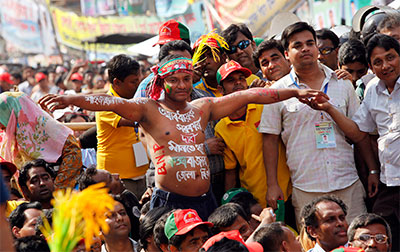“Bangladeshi democracy [may be] doomed to more of the same,” International Crisis Group wrote in a recent commentary. They are describing a longstanding pattern of antagonism between Prime Minister Sheikh Hasina’s Awami League and the opposition Bangladesh National Party (BNP), which the Crisis Group describes as “a pernicious cycle of zero-sum politics.” If the political situation descends into unrest, journalists covering it will suffer.
The latest cause for concern is the Awami League’s adoption of a fifteenth amendment to the constitution, which does away with the need for a neutral, caretaker government to oversee general elections, according to International Crisis Group and news reports. The amendment also states that criticizing the constitution now comes with a charge of sedition. In response, the BNP has called for political agitation around the country, and may boycott the next elections due in 2013, the Crisis Group reports.
Violence against journalists has worsened this year. At least nine were injured in May when a group wielding machetes attacked the newsrooms of the bdnews24 website. Other attacks on the press were documented that month:
- Fazlur Rahman, Pabna district correspondent of the Bengali-language daily Samakal, received hospital treatment for arm and leg wounds on May 22 after men with machetes attacked him for reporting that a dance performance sponsored by a local university was obscene, according to local press freedom group Bangladesh Media Watch and local English-language newspaper The Daily Star. Two men were jailed for carrying out the attack, the Star reported.
- Local newspaper The Daily Sun and Media Watch reported that Abdullah Al Mamun, reporter with the Bengali-language daily Kaler Kantho, was beaten unconscious, also in Pabna, by Aminul Islam, the nephew of the Awami League’s Minister for Home Affairs Shamsul Hoque Tuku, for his reports accusing Tuku of corruption. Tuku told the local press his nephew had led the attack for personal reasons, according to bdnews24.
- Police in the capital, Dhaka, beat three daily Bengali-language Prothom Alo photojournalists and snatched their cameras while they were covering a demonstration by students of the Dhaka Women Polytechnic Institute on May 26, according to local news reports. Nine officers were suspended for involvement in the attack, The Daily Star reported.
The deteriorating environment for the press is all the more concerning since 2012 is the first year Bangladesh has not featured on CPJ’s Impunity Index, which spotlights countries where journalists are murdered regularly and killers go free. “While no convictions have been recorded in journalist murders there over the last decade, a seven-year absence of journalist killings led Bangladesh to be dropped from the index,” CPJ reported.
The February murders of television journalists Meherun Runi and Golam Mustofa Sarowar are not included in the Index because CPJ is still determining the motive in those killings. But police have failed to make headway in that investigation, which, as they are also accused of beating photojournalists, will only further undermine media confidence in law enforcement. Sheikh Hasina must publicly commit to protecting journalists if she is to reverse this trend. Otherwise, Bangladesh is on the brink of slipping back, not just into zero-sum politics, but a pernicious cycle of impunity for attacks on the press.
